- Home
- Hilary Wilde
The Golden Maze Page 5
The Golden Maze Read online
Page 5
She knocked on the front door. It opened immediately as if Mrs. Stone had been waiting for her. Now she stood back, her face bright with triumph.
"You're late, Miss Preston. I thought you might be lost now. There's a gentleman waiting to see you."
"A gentleman ?" Cindy was startled. Who did she know who'd be visiting her? A sudden rush of hope filled her. Could it be David Baxter? Come to apologise for his strange and rude behaviour?
She pulled off her coat and scarf, running her hands through her hair, and went to the big drawing-room.
A tall man stood by the fire. Now he turned to look at her. It was David Baxter ! In his hand was a newspaper.
CHAPTER SIX
HE came towards her with no smile or sign of friendliness on his face.
He lifted the newspaper. "How do you explain this ?" he asked.
She stared at him, startled, indeed bewildered. He had changed ! His voice was much deeper—his face ' more suntanned, his fair hair shorter. How could he have changed in so short a time?
"You are Mr. Baxter ?" she said uncertainly.
"Of course I am. Why else should I be here? I want an explanation of this." He lifted the paper again as he spoke curtly.
Something seemed to snap inside her. "About what? I haven't seen a paper today, but I'm absolutely sick of your rudeness. Waving the paper at me on the ferry like that !"
"What on earth are you talking about? What ferry? I drove up from London as soon as I read the article." Suddenly she knew I It was the voice she had been unable to forget. The voice he had used in London as he teased her about her eyes and her height.
"You are . . ." she hesitated. "You are David Baxter ?"
He frowned, his thick eyebrows almost meeting. "David Baxter? Of course I'm not. I'm Peter Baxter."
"Peter !" Without thinking, Cindy put out her
hand vaguely and the next moment the man had her by the arms and was gently pushing her into an armchair.
. "Let's get this straight," he said briskly. "You seem to have had a shock. What made you think I was David Baxter? Incidentally, he's my cousin."
"I can see now you're so different. I thought when I saw him—that it was you."
"If you remember, you'd left your glasses behind, so you didn't really know what I looked like."
"No, I didn't. He was big and tall and fair and .. ." Cindy shook her head slowly, her long hair swinging. "I'm beginning to understand."
"Understand what ?"
"His behaviour. I spoke to him and he . . ."
"Was rude? He's not noted for his good manners. Has a foul temper, too. What's all this about waving a paper at you?"
"I . . . I was on the ferry . . . I wanted to get away. They were all so unfriendly, I couldn't understand it .... and then I turned my head and he was in the next car and he looked furious. I thought he was going to throw the paper at me and . . ."
"I see." Peter pulled up a small straight-backed chair and straddled it, looking at her thoughtfully. "You haven't read the paper today?" He passed it to her. "I suggest you read the front page article. It might explain a lot of things."
Cindy opened the paper and stared at the headlines.
TEENAGER PLANS TO SELL MOCK CASTLE
SHE MAY INHERIT FOR
TWENTY THOUSAND POUNDS
Underneath it said : "A nineteen-year-old girl who may become heiress to a mock castle in Cumberland has been offered twenty thousand pounds by an American who plans to demolish the castle and rebuild it, stone by stone, in America. A distant ancestor of his lived in the castle soon after it was built and he has always wanted to live in it himself—but in his own country. Of course there is always the possibility that the real heir—the son of the deceased—may appear. No one seems to know why this girl, who is no relation to the Baxter family, should have been made heiress at all. She said that if the castle is hers, she will sell it to the American. Local people are angrily against the project. It is their castle, they say, not hers."
Cindy looked up as she finished reading. "But it isn't !" she said, her voice shocked. "No American has offered me twenty thousand pounds." Her hand flew to her mouth. "Today, just-before lunch, there was a letter for me. But it wasn't really for me—it was addressed to the owner so I sent it to Mr Ayres .. ."
"After opening it ?"
Cindy frowned. "I didn't open it. I am ... was not the owner, so I went straight down to the village and posted it off." -
"Paul Stone says you opened it and smiled."
Cindy was on her feet. "Paul is lying." She glared at the man. "Of course, if you prefer to believe him ..." She turned and walked to the door, but Peter Baxter was quickly on his feet, grabbing her by the arms, turning her round.
"Where do you think you're going?"
"To pack my clothes and drive back to London. I have no right to be here now."
"I agree." Surprisingly, he smiled. "All the same, I'm not allowing a slip of a girl like you to drive back to London alone in the dark. You stay here tonight," he said quietly—very quietly, so quietly that she looked at him quickly. It had been an order, not a suggestion.
"Why should I?"
He smiled. "Because I say so, and. I'm a lot stronger than you." He bent one arm, pretending to flex his muscles.
She found herself laughing. "Are you threatening me?"
"Not really. Now I'll ask you politely : Please stay the night. It's going to be foggy and Keith Ayres would never forgive me if anything happened to you."
"Keith Ayres?" she was puzzled. "You mean the solicitor?"
"Who else?" Peter Baxter chuckled. "Don't tell me you didn't notice? He fell for you, hook, line and sinker." He laughed. "He thinks you're ... well, quite something."
"But I only met him once !" Cindy was startled. "I liked him, but . .."
"There was no 'but' about his liking for you. Although he was pleased to see me, he was equally disappointed because you wanted the castle and he knew I didn't."
"You don't !" Cindy took a step backwards and his hand fell off her arm.
"No, I've always hated it, but ..." He led her back
to the chair "Sit down and let's talk about this sanely."
She sat down. "Look, Mr. Baxter . .."
"Please call me Peter,- and you're . . .?"
"Cindy—Lucinda Preston." She leaned forward. "Mr... . I mean Peter, I just don't understand. You met me in London, I told you all about the castle and the missing son. You must have known it was Claife Castle."
"Of course I did. I'd seen the advertisement and wasn't very keen to claim the heritage. I knew it would probably cost me more than it was worth. My memories of this place are not particularly happy, but I was persuaded that it was my duty." He
smiled ruefully. "An example of the power of a woman being underestimated. In a way, she was right. I went there, met you and realised how much the castle meant to you, so I decided not to make a claim but to let you have it."
"You were going to let me have it ?" Cindy stared at him in amazement. "But it's yours !"
"Then let's see it as a gift to you. At least ..." his voice suddenly changed, "it was to be a gift. I didn't realise the first thing you'd do would be to sell it. Seeing that my father left it to you because he believed you loved it . . . well, it made me change my mind about you."
"But I knew nothing about the sale. How could I sell something that wasn't mine?" Cindy twisted her hair round one hand. "Look," she leaned forward, "I only got that letter before lunch. This article was in the morning's paper. I knew nothing about it."
"That, of course, would be your story," he said.
Again his voice was cold and unfriendly. "The letter today might have been an acknowledgement of your acceptance of the offer."
She let go of her hair, shook her head and leaned back.
"You think I'm that sort of person?"
"No, I didn't think so. I don't. All the same, I gathered from Keith Ayres that you have no money of your own, only the pittance y
ou earn—" He smiled suddenly. "I gather you're a careful saver and have your own car, but as he said, that's hardly enough to run a castle this size. I know he arranged for you to see Luke as well. I'm sure he depressed and frightened you about the money needed. It is a heavy burden to put on a teenager's shoulders. In fact, my father should have known better. Of course Ayres wanted you to sell it."
"But why ?" Cindy was bewildered. Keith Ayres had seemed so nice.
Peter Baxter chuckled. "Because he wants you in London, of course." He stood up. "Look, I fancy a drink, and I expect you can do with one. I suggest you go and have a quick wash and change into a. pretty frock and then we'll have a drink and something to eat. We might as well enjoy this evening."
She stood up. "Enjoy ?" she said slowly. "Enjoy ?"
Peter turned and looked at her. "Please don't do anything dramatic and run away. My car is faster than yours, so I would soon catch you. Besides, the fog has come down pretty badly. See you in ten minutes," he said, and left the room.
She moved very slowly. Her limbs felt heavy and tired. Somehow she walked upstairs and into her
ice-cold bedroom. Rather like a robot she moved, washing, finding her pale green trouser suit and changing, brushing her hair and pinning it up on her head, she looked anxiously in the mirror. Should she wear her glasses or not? she asked herself. She decided she had better wear them or else it would give him an opportunity to tease her. What a funny face she had ! Her cousins were right. What man in his senses would look twice at her? Peter's jokes about the solicitor liking her just proved it. He—Peter, that was—was only being kind—just as Mr. Jenkins had been. How small her face was—with the strange oval look and the big round glasses. She pulled them off, but then her reflection was blurred. Maybe that was why she thought she was better-looking without them, she told herself, and put the glasses on again.
She looked round her. Her last night in what she had thought was—or might be—her own castle. She went to the window. The fog was thick, curling itself round in the darkness like the cloak of a witch who was flying by on her broomstick.
The long flat book she had found in the secret drawer was safely locked in her suitcase. She would read it that night, she decided, and then give it to Peter. It was his by rights, yet she wanted badly to read it, for there were several things that puzzled her.
For one thing, Mrs. Stone saying that Peter had ever come to see his father, yet Luke Fairhead had said he had seen Peter come, and also seen him
turned away by Mrs. Stone, 'his face white as a sheep being sick'. Cindy would have trusted Luke Fairhead any day before Mrs. Stone. And why had Paul Stone lied about the letter? He had been the
one who wanted her to open it. He must have lied deliberately, but why? What for?
In addition, there were the nice things Mrs. Usher had said about Peter Baxter. And she knew him well. As Mrs. Stone implied, if Peter so hated his father, would he deliberately shoulder what he had called the 'burden' of the castle simply because he had believed Cindy was prepared to sell it, which was something his father would have hated?
It didn't make sense. There were too many contradictions. Perhaps, reading Uncle Robert's notes might give her the answer.
She went downstairs. Peter was waiting for her—the armchairs drawn up close to the flaming fire, a drink ready. He sat by her side and they talked. Lightly, amusingly as he told her of his interesting life and incidents that had happened to him during his working years abroad. It was a pleasant evening, only marred by Mrs. Stone's behaviour. The dinner was delicious, but she didn't say a word to Cindy. Cindy might just as well not have been there, she was so completely ignored while Mrs. Stone almost crawled at Peter's feet, determined to please him.
Afterwards as they drank their coffees by the fire, Peter looked at Cindy and grinned.
"Poor Mrs. Stone ! Afraid of losing her job."
"I suppose she is." Cindy hadn't thought of that.
"What about your job? Have you lost it?"
"Oh no," Cindy said eagerly. "Mr. Jenkins said I could have a week off. I had some holiday time due."
"A week ? How long have you been here? One day to come up, two days here, so why not stay the whole week ? As my guest, of course."
Cindy stared at him. "But why? I mean ..."
"Because you love the Lake District and the castle. It may make your disappointment a little less painful. Besides, I'd be glad of your advice. Something must be done to make the castle habitable—new curtains and carpets and .. . Your advice would be of great help," he added, and then smiled. "Doesn't that sound pompous? Sorry, but I'd like you to stay."
Cindy looked round the room wildly. Part of her longed to stay while the other part told her to run. And fast, too ! This was the man she had fallen hopelessly in love with, the man she could not forget, and there could only be one result—heartache. Yet she wanted so badly to stay.
She was startled when he leaned forward and put his hand on hers. The touch of his warm fingers sent a tingling through her. "Please !" he said quietly. "It's years since I've been here and I'd enjoy driving round the Lakes with you. It's not much fun on your own."
Staring at him as if mesmerised, Cindy swallowed.
"I'll stay," she said. "Just for the rest of the week."
He let go her hand. "Good ! That calls for another
drink."
Later that night, in bed, Cindy read some more of Robert Baxter's notes. He blamed himself for losing his son, wished he could contact him and say how sorry he was, but the son never gave him an address, never approached him. Yet Luke Fairhead had said he'd seen Peter there ! And Mr. Fairhead would not lie, Cindy thought.
Peter was already in the dining-room when Cindy
went down for breakfast. He greeted her with a smile.
"Don't look as if you're on the way to the guillotine," he said. "I'm not going to eat you, you know."
As usual, Cindy found herself laughing with him. "I'm sorry, I didn't intend to look scared."
Mrs. Stone came in with a big plate of sausages, bacon and eggs. She gave Cindy a strange look.
"You'll be packing to go now ?" she asked, but it was more of a statement than, a question.
Peter spoke before Cindy could. "On the contrary, Mrs. Stone, Miss Preston has consented to stay for the rest of the week as my guest."
Mrs. Stone looked startled. "Is that so now?" she said, and almost scuttled from the room.
"Was Mrs. Stone here before you . " Cindy began, and then stopped, feeling her cheeks burn, for it was no business of hers and she had no desire to awaken sad memories.
But Peter didn't seem to mind. "No," he said, "we had a dear old ex-nannie. You know the kind I mean. Unfortunately she died and I suppose, my father engaged Mrs. Stone because he was sorry for her. My father was a strange man," he went on as they ate their breakfast. "The essence of compassion and
understanding except where it concerned his son." Cindy looked at him quickly. "Perhaps that was because he loved you."
"Loved me? I doubt it," said Peter. `More coffee? Sleep all right?"
"Fine." Cindy hesitated. Should she tell him about the diary she had found? Surely that would make him realise how much his father had loved him, and
how greatly he regretted the quarrel? But Mrs. Stone came hustling back with some crisp hot toast.
"I hope it's all to your liking, Mr. Baxter," she said.
Peter smiled at her. "Splendid, Mrs. Stone, thanks." Mrs. Stone made a quick exit, giving a strange look in Cindy's direction.
"Why doesn't she like me?" Cindy asked.
Peter laughed. "You're not as dumb as that, surely, Cindy? In the first place, she obviously expected the castle to be taken over by some wealthy person, so she hoped she could stay on ... then you turn up, a bit of a girl without a penny, so she sees the sack—then she hears the castle is to be demolished, and then I turn up. She must feel very confused and has to blame someone, and you happen to be handy "
"
I suppose that's one way of explaining it, but she hated me from the beginning ... as they all do," Cindy said wistfully.
"Can you blame them?" Peter frowned, rubbing his chin. Cindy realised suddenly that was a habit of his. She saw there was a cleft in his chin, or was it a dimple? He was looking at her with ill-concealed amusement and she felt her cheeks go hot.
"It wasn't my fault," she said defiantly. "Uncle Robert chose me. I didn't ask him to make me his second heir."
"It wasn't that. It was the thought of the castle being pulled down and moved to another land."
"That had nothing to do with me, either !" Cindy's voice rose angrily. "I know you don't believe me, but it's the truth. I had no idea until you showed me the newspaper."
He went on, half smiling at her in that hateful way. "Is that so ?" he said slowly.
Cindy's hand closed round the marmalade jar she happened to have in her hand. Never before had she so felt like throwing something at anyone. She put it down, stood up and said :
"I think it would be best if I leave at once."
He stood up, too. "I agree, provided we leave together in the same car."
They stared at one another, Cindy clenching and unclenching her hands. It wasn't right or fair for any man to be so handsome—to have those kind of eyes, that mouth .
"You did promise to stay," Peter said gently, Cindy swallowed. "All right. I'd . I'd like to see Mrs. Usher."
"Dear old Mrs. Usher? Is she still here ?" Peter sounded pleased. "I'd like to see her too. Look, I'll drop you there and go into the village as I have business to attend to and then I'll come back and pick you up ? Okay ?"
"Okay," Cindy agreed, and went up to her room, changing into a pale yellow woollen frock, looking worriedly at her face half-hidden by her hair and glasses. He was being very pleasant, but at the same time she was conscious of this curtain between them—the curtain he had dropped because he could not—or would not—believe her.
Peter was waiting in front, wandering round. He looked up as she joined him.

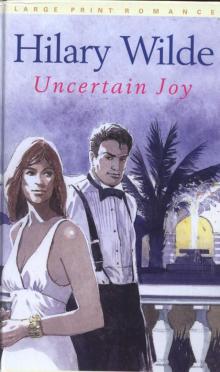 Uncertain Joy
Uncertain Joy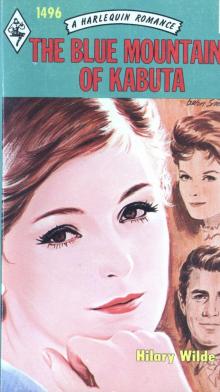 The Blue Mountains of Kabuta
The Blue Mountains of Kabuta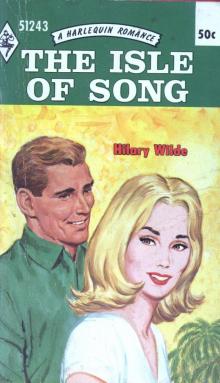 The Isle of Song
The Isle of Song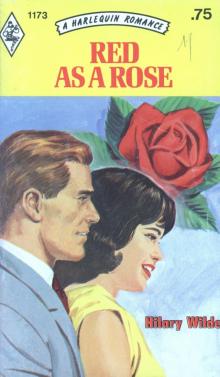 Red as a Rose
Red as a Rose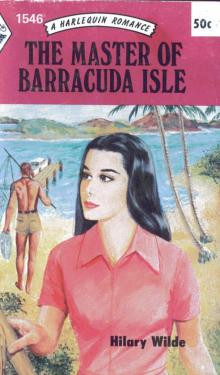 The Master of Barracuda Isle
The Master of Barracuda Isle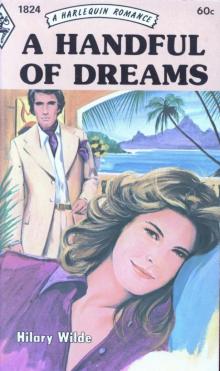 A handful of dreams
A handful of dreams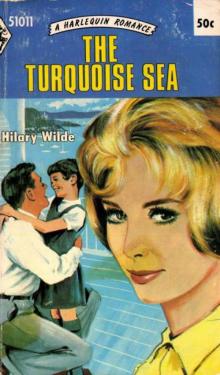 The Turquoise Sea
The Turquoise Sea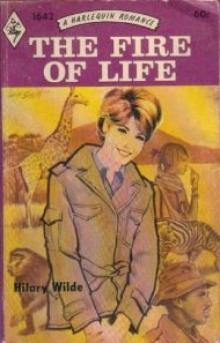 The Fire of Life
The Fire of Life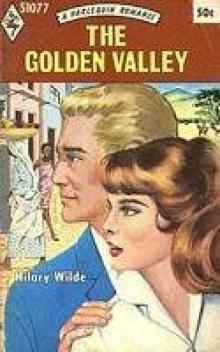 The golden valley
The golden valley The Impossible Dream
The Impossible Dream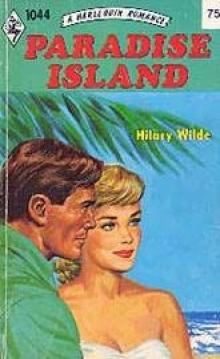 Paradise Island
Paradise Island